Kaylea Titford: Neglected teen left to die alone at home by parents
 BBC
BBCAlun Titford, 45, and Sarah Lloyd-Jones, 40, from Newtown, Powys, have been jailed for gross negligence manslaughter after their teenage daughter, Kaylea, was found dead in squalid conditions. Wales correspondent Hywel Griffith asks how a fiercely independent, funny teenager became the victim of such a crime and died alone aged 16.
Everyone who knew Kaylea Titford said she was a lovely girl - and living at home with her working parents, there was a feeling everything was OK.
Kaylea dealt with challenges after being born with spina bifida, yet loved wheelchair basketball and was talked of as a possible paralympian.
The shocking details about how a morbidly obese teenager, weighing almost 23st (146 kg), was treated by those who were supposed to care for her and the grim circumstances of her death have made international headlines.
Some readers may find details and pictures in this story distressing.
In February, Kaylea's dad Alun, a father of six, was convicted of gross negligence manslaughter - a charge her carer mum Sarah Lloyd-Jones, 40, had already admitted.
On Wednesday, Titford was sentenced to seven years and six months, and Lloyd-Jones to six years, at Swansea Crown Court.
Emergency services told jurors about how they felt "physically sick" as maggots were found feeding on her body as she lay in soiled clothing and bed linen in her fly-infested, dirty and cluttered room.
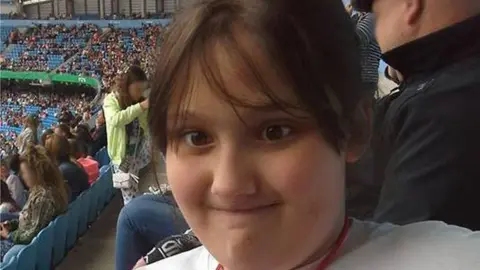
The courtroom heard she had been restricted to her bed for more than six months - since the start of the UK's Covid lockdown - when she died at her mid Wales home in October 2020.
'Lovely and pleasant young girl'
But beyond headlines of the "squalid" and "inhumane" conditions in which a bedridden Kaylea lived and tragically died, there was a "lovely and pleasant" young woman, who had recently celebrated her 16th birthday, seemingly with her whole life ahead of her.
Not long before that, Kaylea was a "quiet yet cheeky" girl who showed "impressive potential" on the wheelchair basketball court of her hometown of Newtown in Powys.
"She was a wonderful person and used to try card games - and she could cheat better than me in the end," joked her old coach Steve Cox.
"She was quietly playful. Board games like Jenga too - and there was pool, she'd cheat at pool too.
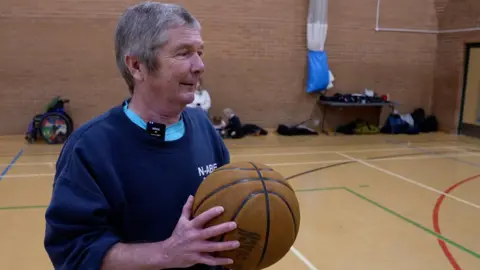
"I'd take a shot, I'd turn my back and when I look around, there'd be a couple of balls missing and she'd give me this sly grin.
"She was very pleasant, a joy to work with. It was a shame we couldn't have worked with her a bit more.
"She was quite impressive. We would have liked to get her higher up the disability sport ladder for, I'd say, we could have got her into the Paralympics at a push."
'Fiercely independent'
Steve isn't the only one to recall Kaylea's strong will, as her former learning support assistant testified at her father's manslaughter trial that she was "fiercely independent".
Belinda Jones, who first began helping Kaylea at Newtown High School in 2016, told Mold Crown Court she was initially very independent and could push herself around in her chair.
Kaylea went to Steve's training sessions between the ages of 10 and 12 and said he and others in the wheelchair basketball circles thought she was a possible "star of the future".
"The early stages of wheelchair basketball is really difficult, but Kaylea certainly took to it like a duck to water," recalled Steve.
"I saw the potential for scoring a basket and the competition between me and her. I couldn't win - she was always so determined as well as being friendly and sociable.
"She also knew that I'm not very technical, so took great pleasure in teaching me how to use a mobile phone as anybody who is my age will realise it's a challenge. She treated me like a caveman basically."
After leaving wheelchair basketball, Kaylea and Steve crossed paths again when he was involved in the local youth club she went to as a 14-year-old.
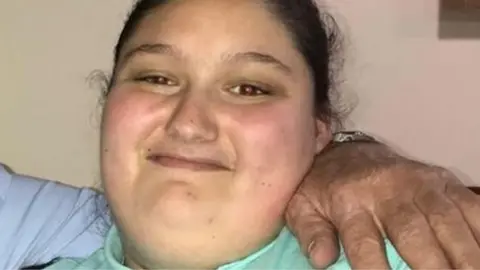 Athena Pictures
Athena Pictures"By then, she was a little bit quieter and withdrawn compared to the girl I was used to who would take great pleasure in putting me down and having fun," he recalled.
"I remember the cheeky smile, the wind-up part of Kaylea as well as her determination and inner strength."
'Death hasn't sunk in'
So hearing the appalling nature of what subsequently happened to one of his former pupils - and one that he remembered so fondly - was tough for Steve to hear.
"Personally I find it hard to read about it," he said.
"Especially because it's somebody you know.
"The first thing you do is think could we have done more? But after a time you think, I did everything I could.

"I can't get my head around it - and in small places like Newtown, a youngster passing away hits the entire town. I don't even think it's totally sunk in with people yet."
Kaylea's 40-year-old mum Sarah Jane Lloyd-Jones, a mother of six, had previously admitted manslaughter by gross negligence and Kaylea's dad Alun Titford, 45, was convicted too after a trial.
His trial had heard Kaylea's mum dealt with welfare calls from her school, especially during the 2020 Covid lockdown, and one Newtown High call log entry said "mum struggling to support Kaylea at home while juggling work as a carer".
Titford was asked in court what he had done to help his partner care for their disabled child, and he said "nothing", admitting it was "possible" things would have been different if he had helped.
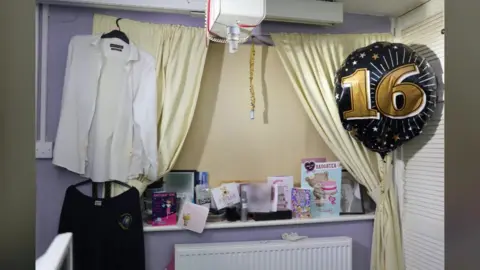 Dyfed-Powys Police
Dyfed-Powys PoliceHowever, he denied causing Kaylea's death, despite revealing to jurors he's "as much to blame for Kaylea's death as Lloyd-Jones".
The removal worker accepted he could have been a better father but said "I got lazy, tired after work" and would do "nothing" at home and just watched television at night in his bedroom.
Was Kaylea let down?
Titford's defence barrister claimed in court Kaylea was "let down" by health and social services.
David Elias said she was discharged from physiotherapy in 2017 in the same year a social worker agreed with Lloyd-Jones that there was no role for the children-with-disabilities team.
The following year, Mr Elias told Mold Crown Court Kaylea was discharged from a dietetics service because Lloyd-Jones did not make a new appointment.
The question authorities will now attempt to get to the bottom of is whether they could have done more to help and prevent Kaylea's death.
Wales' former children's commissioner Sally Holland has said the "appalling circumstances" in which Kaylea died makes this one of the "most horrifying cases" she had come across in more than 25 years in children's services.
Review under way
A child practice review, which is a multi-agency safeguarding study, is already under way.
This will investigate if any child protection lessons should be learned - and what effect lockdown had on Kaylea's care.
"The review will look at were there missed opportunities to speak to Kaylea directly," said Prof Holland.
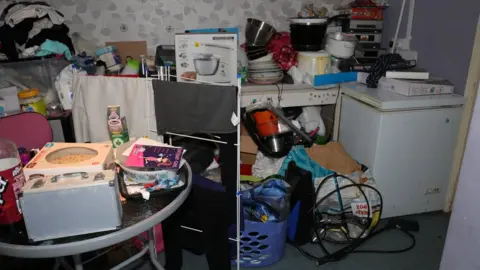 Dyfed-Powys Police
Dyfed-Powys Police"We know there's a risk when children are not seen and spoken to directly. We've seen countless cases over the decades where children have not been seen and we've later found out that they were in a desperate state of being abused or neglected."
Social work consultant Delyth Lloyd Griffiths said Kaylea's school was "good" at logging conversations with her mum.
She added the review will look into whether the authorities could have done more to help a family that had told the school they were struggling.
"In terms of social services, were they involved?" she asked.
"Were there referrals made? Were they giving the family services prior to lockdown? That's what the review will answer."
Ms Lloyd Griffiths told BBC Radio Wales said it would be looking "very seriously" at every agency that worked with Kaylea.
"Children with additional needs and vulnerable children were able to go into some schools [during lockdown]," she said. "Some schools were delivering services in the home.
"Education welfare services, were they not in contact with her," she asked. "If they were, did they have difficulty engaging with the parents possibly?"
She added the review would look at the involvement of health and social services.
"As a child with additional needs, she should be having ongoing support and services."
'Serious questions must be asked'
Dai Davies, former chief superintendent at the Metropolitan Police and a former ambassador for the children's charity Kidscape said the case rated as one of the worst cases of neglect he had come across in over 50 years of being involved in policing and child protection.
"It's horrific and serious questions need to be asked, and an audit trail looked back into who could have prevented this and what we can do to stop this sort of thing happening again," he told BBC Radio Wales Breakfast.
He said an urgent review was necessary.
"We have a sex offenders list now, do we not have one for vulnerable persons? This girl was vulnerable all her life. It's not beyond the realms of possibility to prepare a list of people like this," he said.
"We blame a lot on the pandemic, and rightly so, but I still believe there are serious questions to be asked of a wide range of agencies."
Child protection expert David Niven, however, thinks that while Kaylea was neglected, the tragedy could be "far more sad than bad".
"The parents sounded a bit overwhelmed and incapable of understanding that level of knowing what to do," he said.
"Or if, as they say, Kaylea was a very headstrong girl, then standing up to her and insisting they care for her no matter what, because that was their parental responsibility.
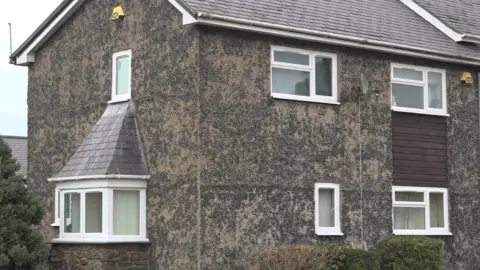
"It is possible she slipped through the social services net in lockdown, but also maybe she was unavoidably missed because she wasn't considered to be at risk and the household wasn't considered to be a dangerous place.
"When you compound that with lockdown, a 15 to 20% social worker vacancy rate, and that the most urgent cases had to be seen by remaining staff, then it's not surprising that if these were the issues, that Kaylea may have been bypassed."
Powys council has said it will not comment until the practice review has been completed.
If you have been affected by any of the issues in this story, the BBC Action Line has links to organisations which can offer support and advice
